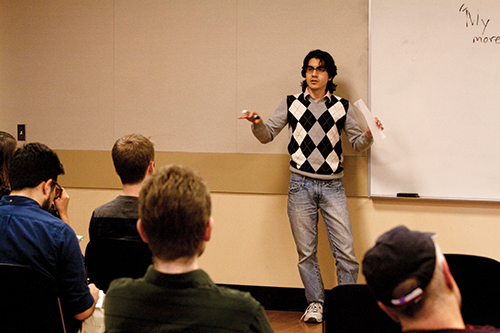Matt Hernandez is fascinated with the question of why people believe what they believe, especially when it comes to their religious beliefs. While reading a book called 50 Reasons People Give for Believing in a God, by Guy P. Harrison, Hernandez found that one of the most common responses people give for believing in their particular religion over another is that, “my religion makes more sense than others.”
Student explores why people are religious

Matt Hernandez is fascinated with the question of why people believe what they believe, especially when it comes to their religious beliefs.
While reading a book called 50 Reasons People Give for Believing in a God, by Guy P. Harrison, Hernandez found that one of the most common responses people give for believing in their particular religion over another is that, “my religion makes more sense than others.”
Inspired to find out why people believe this, Hernandez started looking for answers.
“I had this question. I sought to answer it,” he said.
Another key inspiration for his research was John Stuart Mill’s book On Liberty.
“That analysis of Mill’s was the filter, if you will, [through] which I saw the issue,”
Hernandez said. “The argument I present for how custom influences religious belief—that it thrives in social cognition—is based on this analysis.”
The culmination of his efforts resulted in an essay called “How Custom Influences Religious Belief and Why It Matters.” On Thursday, Hernandez presented his findings to students and peers.
“The whole point of the argument was to bring more validity to the analysis [of On Liberty] by looking at research in neuroscience and psychology. The hope was that the reader, or listener in a presentation, would see analysis as a grounding or primer for looking at that argument,” Hernandez said.
As Hernandez wrote in an abstract for his essay, “Others may desire an alternative explanation that does not assume ignorance on the part of the believer. This essay promotes such an alternative by arguing that social custom influences religious belief, causing many believers to think that their specific religion is more reasonable.”
Studies of the brain have shown that when thinking about their own religion, regions of the brain known as the Default Mode Network are active in the brains of believers. These sections of the brain tend to be active when one focuses on things socially. While believers are thinking about other religions, the analytical Task-Positive Network regions are put to work, Hernandez said.
“Religious believers think about their religion with feelings, while thinking of others critically,” he said.
The activity of the two regions essentially works like a seesaw, Hernandez said. The more one person thinks about their own religion, the more the brain focuses on the social-driven DMN, less so on the TPN. When thinking of others, the effect is reversed.
“There is a necessity of thinking about things from an outsider’s perspective. But this model shows that isn’t always possible,” he said. “You can’t always disconnect feelings.”
This isn’t the last stop for Hernandez and his essay. He will be presenting on the topic at the Pacific University Undergraduate Philosophy Conference and the University of Puget Sound Undergraduate Philosophy Conference.
This is an epic accomplishment, said Dr. Peter Boghossian, a philosophy professor at Portland State. “Matt is one of the best students I’ve ever had. He’s a champion of reason and Enlightenment values and a rising star in philosophy.
“There’s an ancient and honorable tradition of subjecting a thinker’s ideas to public scrutiny,” Boghossian said. “These forums allow for the possibility of having genuine conversation about issues that matter. They make a profound contribution to a life worth living.”
Hernandez will continue to present his ideas in the public forum. He has also written an essay, “Critical Thinking as Education Reform,” that he hopes will be published on the Richard Dawkins Foundation for Reason and Science website. A presentation may be in line for this as well.
“Outside of those paper projects, I’m working on a presentation on the importance of the attitudinal component to critical thinking, with the hope to present that at high schools in the area, and I’m serving on the Chiron Studies Committee, in hopes to promote that program,” Hernandez said.






